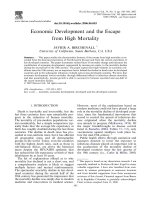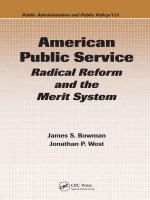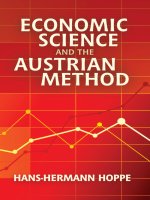Economic Science and the Austrian Method pot
Bạn đang xem bản rút gọn của tài liệu. Xem và tải ngay bản đầy đủ của tài liệu tại đây (5.23 MB, 93 trang )
ECONOMIC SCIENCE
AND
THE
AUSTRIAN METHODECONOMIC
SCIENCE
AND THE
AUSTRIAN METHOD
HANS
HERMANN
HOPPE
Lu~wig
von
Mises
Institute
AUBURN,
ALABAMA
All rights reserved.
Written
permission must be secured from the
publisher to use
or
reproduce any
part
of
this book, except for brief
quotations
in
critical reviews
or
articles.
Copyright
© 1995
and
2007 by the Ludwig von Mises Institute
Ludwig
von
Mises Institute, 518 West Magnolia Avenue,
Auburn,
Ala. 36832; www.mises.org
ISBN
10
digit:
1~933550~11~2
ISBN
13
digit:
978~
1~933550~
11~4
CONTENTS
PREFACE 5
PRAXEOLOGY AND ECONOMIC SCIENCE 7
ON
PRAXEOLOGY AND THE PRAXEOLOGICAL
FOUNDATION OF EPISTEMOLOGY
49
RECOMMENDED READINGS
85
INDEX
87
ABOUT
THE
AUTHOR
89
3
I
t was a tragic day when economics, the queen
of
the
social sciences, adopted the methods associated with
the natural sciences: empiricism and positivism.
In
the
sweep
of
economic thought, this change
occurred-not
coincidentally-about
the same time that intellectuals and
politicians came
to
believe in the efficacy
of
government
planning. Despite their failures, both doctrines remain god-
less faiths
of
our
age.
In
this extraordinary
essa~
Hans-Hermann
Hoppe
ex-
tends the argument
of
Ludwig von Mises that the methods
associated with natural sciences cannot be successfully ap-
propriated for economic
theor~
Professor
Hoppe
then ar-
gues for the existence
of
a priori knowledge, the validity
of
pure
theor~
the use
of
deductive logic, the implacability
of
economic
law,
and the view that economics
is
but
a
part
of
the larger discipline
of
praxeology: the science
of
human
action.
If
economists are
to
free themselves from the failed
assumptions that they can precisely predict the future and,
thus, that the state can plan the economy better than the
market, they will have
to
revisit more fundamental meth-
odological errors. When
that
happens, Professor
Hoppe,
the
outstanding praxeologistworking
toda~
will have played an
indispensable role.
-Llewellyn
H.
Rockwell,
Jr.
Ludwig
von Mises
Institute
The
Ludwig
von
Mises
Institute
• 5
AND
ECONOMIC
SCIENCE
I
t
is
well-known
that
Austrians disagree strongly
with
other
schools
of
economic
thought,
such
as
the
Keynesians, the Monetarists, the Public Choicers, His-
toricists, Institutionalists, and Marxists.
1
Disagreement
is
most
conspicuous,
of
course,
when
it
comes
to
economic
policy
and
economic policy proposals. At times there also
exists an alliance between Austrians and, in particular, Chi-
cagoites and Public Choicers. Ludwig von Mises, Murray N.
Rothbard, Milton Friedman, and James Buchanan,
to
cite a
few names, are often united in their efforts
to
defend the free
marketeconomy againstits "liberal" and socialistdetractors.
Nonetheless,
as
important
as
suchoccasional agreements
may be for tactical
or
strategic reasons, they can only be
superficial, for they cover up some truly fundamental differ-
ences between the Austrian school,
as
represented by Mises
and Rothbard, and all the rest. The ultimate difference from
which all disagreements
at
the
levels
of
economic
theory
and economic policy stem-disagreements, for instance,
IThe first
two
essays are based
on
two
lectures delivered at
the
Ludwig von
Mises Institute's
'~dvanced
Instructional Conference
on
Austrian Economics,"
June
21-27,
1987. The third essay
is
reprinted from
The
Economics
and
Ethics
of
Private
Property
(Kluwer Academic Publishers in 1993), pp.
141-64.
The
Ludwig von Mises Institute • 7
Economic
Science
and
the
Austrian Method
as
regards the merit
of
the gold standard
vs.
fiat
mone~
free-banking
vs.
central banking, the welfare implications
of
markets
vs.
state-action, capitalism
vs.
socialism, the theory
of
interest and the business cycle,
etc concerns
the answer
to
the very first question
that
any economist
must
raise:
What
is
the subject matter
of
economics, and
what
kind
of
propositions are economic theorems?
Mises's answer
is
that economics
is
the science
of
human
action.
In
itself, this may
not
sound very controversial.
But
then Mises says
of
the science
of
economics:
Its statements
and
propositions are
not
derived from expe-
rience.
They
are, like those
of
logic
and
mathematics, a
priori.
They
are
not
subject
to
verification
and
falsification
on
the
ground
of
experience
and
facts.
They
are
both
logically
and
temporally antecedent
to
any comprehension
of
historical facts.
They
are a necessary requirement
of
any
intellectual grasp
of
historical events.
2
In
order
to
emphasize the status
of
economics
as
a pure
science, a science
that
has
11-10re
in common with a discipline
like applied logic than, for instance, with the empirical
natural sciences, Mises proposes the term "praxeology" (the
logic
of
action) for the branch
of
knowledge exemplified by
economics.
3
It
is
this assessment
of
economics
as
an a priori science,
a science whose propositions can be given a rigorous logi-
cal justification, which distinguishes Austrians,
or
more
2Ludwig
von
Mises, Human Action (Chicago:
Henry
Regnery,
1966),
p. 32.
3Mises's methodological
work
is
contained
mainly in his
Epistemological
Problems
of
Economics
(New
York:
New
York University Press,
1981);
Theory
and
History
(Washington,
D.C.:
Ludwig
von
Mises
Institute,
1985);
The
Ultimate
Foundation
of
Economic
Science
(Kansas City, Kans.: Sheed Andrews
and
McMeel,
1978); Human Action,
part
I.
8 •
The
Ludwig
von
Mises
Institute
Hans-Hermann
Hoppe
precisely Misesians, from all
other
current
economic
schools. All the others conceive
of
economics
as
an empirical
science,
as
a science like physics, which develops hypotheses
that
require continual empirical testing. And they all regard
as
dogmatic and unscientific Mises's view that economic
theorems-like
the law
of
marginal
utili~
or
the law
of
returns,
or
the time-preference theory
of
interest and the
Austrian business cycle
theory-can
be given definite proof,
such
that
it
can be shown
to
be plainly contradictory
to
deny
their
validi~
The view
of
Mark Blaug, highly representative
of
main-
stream methodological thought, illustrates this almost uni-
versal opposition to Austrianism. Blaug says
of
Mises,
"His
writings
on
the foundations
of
economic science are so
cranky and idiosyncratic
that
one can only wonder
that
they
have been taken seriously by anyone.,,4
Blaug does
not
provide one argument
to
substantiate his
outrage.
His
chapter
on
Austrianism simply ends with
that
statement. Could
it
be
that
Blaug's and
others'
rejection
of
Mises's apriorism
may
have
more
to
do
with
the
fact
that
the
demanding
standards
of
argumentative rigor, which
an apriorist methodology implies, prove
too
much for
them?5
4
Mark
Blaug,
The
Methodology
of
Economics
(Cambridge: Cambridge Univer-
sity Press, 1980), p. 93; for a similar statement
of
outrage see Paul Samuelson,
Collected
Scientific
Papers,
vol. 3 (Cambridge, Mass.: Harvard University Press,
1972), p. 761.
5Another prominent critic
of
praxeology
is
Terence W Hutchison,
The
Significance and
Basic
Postulates
of
Economic
Theory
(London: Macmillan, 1938).
Hutchison, like Blaug an adherent
of
the Popperian variant
of
empiricism, has
since become much less enthusiastic about the prospects
of
advancing economics
along empiricist lines (see, for instance, his
Knowledge
and
Ignorance
in
Economics
[Chicago: University
of
Chicago Press, 1977]; and
The
Politics
and
Philosophy
of
Economics
[New
York:
New
York
University Press, 1981]), yet he still sees no
alternative
to
Popper's falsificationism. A position and development quite similar
The Ludwig von Mises Institute • 9
Economic
Science
and
the
Austrian Method
What
led Mises
to
his characterization
of
economics
as
an a priori science? From the present day perspective
it
might
be surprising
to
hear
that
Mises did
not
see his
conception
as
out
of
line with the mainstream view prevail-
ing in the early twentieth
centur~
Mises did
not
wish
to
prescribe
what
economists should be doing
as
opposed
to
what
they actually were doing. Rather, he saw his achieve-
ment
as
a philosopher
of
economics in systematizing, and
in making explicit
what
economics really was, and
how
it
had implicitly been conceived by almost everyone calling
himself an economist.
And this
is
indeed the case.
In
giving a systematic
explanation
of
what was formerly only implicit and unspo-
ken knowledge, Mises did introduce some conceptual and
terminological distinctions that had previously been unclear
and unfamiliar,
at
least
to
the English-speaking world.
But
his position
on
the status
of
economics was essentially in
full agreement with the then-orthodox view
on
the matter.
They did
not
employ the term "a priori,"
but
such main-
stream economists
as
Jean Baptiste
Sa~
Nassau Senior, and
John
E. Cairnes, for instance, described economics quite
similarl~
Say writes:
"A
treatise
on
political economy will
be
confined to the enunciation
of
a few general principles,
not
requiring even the support
of
proofs
or
illustrations; because
to
Hutchison's
is
to
be found in
H.
Albert (see his earlier
Marktsoziologie
und
Entscheidungslogik
(Neuwied: 1967). For a critique
of
the empiricist position, see
Hans-
Hermann
Hoppe, Kritik
der
kausalwissenschaftlichen
Sozialforschung.
Unter-
schungen
zur Grundlegung
von
Soziologie
und
Okonomie
(Opladen: 1983); "Is
Research Based
on
Causal Scientific Principles Possible in the Social Sciences?"
Ratio 25, no. 1 (1983);
"In
Defense
of
Extreme Rationalism,"
Review
of
Austrian
Economics
3 (1988);
"On
Praxeology and the Praxeological Foundations
of
Epis-
temology and
Ethics," in Llewellyn
H.
Rockwell, Jr., ed.,
The
Meaning
of
Ludwig
von
Mises
(Auburn, Ala.: Ludwig von Mises Institute, 1989).
10 •
The
Ludwig von Mises Institute
Hans-Hermann Hoppe
these will be
but
the expression
of
what
every one will
knO\\T,
arranged
in
a form convenient for comprehending them,
as
well
as
in their whole scope
as
in
their relation
to
each
other."
And
"political economy
whenever the principles
which constitute its basis are the rigorous deductions
of
undeniable general facts, rests
upon
an immovable founda-
tion.,,6 .
According
to
Nassau Senior, economic "premises consist
of
a few general propositions, the result
of
observations,
or
consciousness, and scarcely requiring proof,
or
even formal
statement, which almost every man,
as
soon
as
he hears
them, admits
as
familiar
to
his thoughts,
or
at
least
as
included in his previous knowledge; and his inferences are
nearly
as
general, and,
ifhe
has reasoned correctl);
as
certain
as
his premises."
And
economists should be "aware
that
the
Science depends more
on
reasoning than
on
observation,
and
that
its principal difficulty consists
not
in the ascertain-
ment
of
its facts,
but
in the use
of
its terms.,,7
And
John
E. Cairnes remarks
that
while "mankind has
no
direct knowledge
of
ultimate physical principles"
"the
economist starts
with
a knowledge
of
ultimate causes."
"The
economist may thus be considered
at
the outset
of
his
researches
as
already
in
possession
of
those ultimate princi-
pIes governing the phenomena which form the subject
of
his study; the discovery
of
which
in
the case
of
physical
investigation constitutes for the inquirer his
most
arduous
task." "Conjecture [in economics]
would
manifestly be
out
of
place, inasmuch
as
we possess
in
our
consciousness and
6
Jean
-Baptiste
Say,
Ireatise
on
Political Economy
(New
York:
Augustus
Kelley,
[1880]
1964),
p. xx, xxvi.
7Nassau Senior,
An
Outline
of
the Science
of
Political Economy
(New
York:
Augustus
Kelley,
[1836]
1965),
pp.
2-3,
5.
The
Ludwig von Mises
Institute
• 11
Economic
Science
and
the
Austrian Method
in the testimony
of
our
senses . . . direct and easy
proof
of
that which we desire
to
know:
In
Political
Econom~
accord-
ingl~
hypothesis
is
never used
as
a help toward thediscovery
of
ultimate causes and laws."s
The views ofMises's predecessors, Menger, Bohm-Baw-
erk, and Wieser, are the same:
The~
too, describe economics
as
a discipline whose propositions
can-in
contrast
to
those
of
the natural
sciences-be
given some ultimate justifica-
tion. Again, however, they do so
without
using the termi-
nology employed by Mises.
9
And
finall~
Mises's epistemological characterization
of
economics was also considered quite
orthodox-and
cer-
tainly
not
idiosyncratic,
as
Blaug would have
it-after
hav-
ing
been explicitly formulated by Mises. Lionel Robbins's
book
The
Nature and
Significance
of
Economic
Science,
which
first appeared in 1932,
is
nothing
but
a somewhat watered-
down
version
of
Mises's
description
of
economics
as
praxeolo~
Yet
it
was respected by the economics profession
as
the guiding methodological star for almost twenty years.
In
fact, Robbins, in his Preface, explicitly singles
out
Mises
as
the
most
important source
of
his
own
methodo-
logical position. And Mises and Richard von
Strigl-whose
8
J
ohn
E. Cairnes,
The
Character and
Logical
Method
of
Political
Economy
(New
York:
Augustus
Kelley,
1965), p.
83,87,
89-90,95-96.
9See Carl Menger,
Untersuchungen
uber
die
Methoden
der
Sozialwissenschaften
(Leipzig: 1883); idem, Die Irrtumer
des
Historismus
in
der
Deutschen
Nationalok-
onomie
(Wien:
1884);
Eugen von Bohm-Bawerk, Schriften, E
X.
Weiss, ed.
(Vienna: 1924); Friedrich von Wieser,
Theme
der
gesellschaftlichen
Wirtschaft
(Tiibingen: 1914); idem,
Gesammelte
Abhandlungen (Tiibingen: 1929). For
Mises's evaluation
of
his predecessors, see his
Epistemological
Problems
of
Economics
,
pp. 17-22. The term "a priori" in connection with economic theorems
is
also used
by Frank
H.
Knight; his methodological writings, however, lack systematic rigor.
See his "What Is Truth in Economics," in Knight,
On
the
History
and Method
of
Economics
(Chicago: University
of
Chicago Press, 1956); and his
"The
Limitations
of
Scientific Method in Economics," in Knight,
The
Ethics
of
Competition
(Chi-
cago: University
of
Chicago Press, 1935).
12
•
The
Ludwig von Mises Institute
Hans-Hennann
Hoppe
position
is
essentially indistinguishable from Mises'slo
-are
cited approvingly in the text more often than anyone else.
II
Yet,
illuminating
as
all this may be for an assessment
of
the present-day situation,
it
is
only
histor~
What
then is the
rationale
of
the classical economists for regarding their
science
as
different
than
the
natural
sciences?
And
what
is
behind
Mises's explicit reconstruction
of
this difference
as
one
between an a
priori
science
and
an aposteriori science?
It
was
the
recognition
that
the
process
of
valida-
tion-the
process
of
discovering
whether
some
propo-
sition
is
true
or
not-is
different
in
one
field
of
inquiry
than
in
the other.
Let
us first look briefly
at
the natural sciences.
How
do
we know
what
the consequences will be
if
we subject some
nature-given material
to
specified tests, let's
sa~
if
we mix
it
with
another kind
of
material? Obviously we
do
not
know
before we actually try
it
and observe
what
happens.
We
can
make a prediction,
of
course,
but
our
prediction
is
only a
hypothetical one, and observations are required
to
find
out
if
we are
right
or
wrong.
Moreover, even
if
we have observed some definite
out-
come, let's say
that
mixing the two materials leads
to
an
explosion, can we then be sure
that
such an outcome will
lORichard von Strigl,
Die
okonomischen
Kategorien und
die
Or;ganisation
der
Wirtschaft (Jena: 1923).
11
It
may be worth mentioning that Robbins's methodological position, much
like Friedrich
A.
Hayek's, became increasingly less Misesian over time due mainly
to
the influence
of
Karl R. Popper, their colleague at the London School
of
Economics. See
on
this Lionel Robbins,
An
Autobiography
of
an
Economist
(Lon-
don: Macmillan, 1976); Hayek's disagreement with Mises's idea
of
praxeology
has been most recently restated in his "Einleitung" to Ludwig von Mises's
Erinnerungen (Stuttgart: 1978). Mises's own, entirely negative verdict
on
Popper
can
be
found in his
The
Ultimate
Foundation
of
Economic
Science,
p. 70. In support
of
this verdict see also Hans H.
Hoppe
Kritik
der
kausalwissenschaftlichen
Sozial-
forschung
(Opladen: Westdeutscher Verlag, 1983), pp.
48-49.
The Ludwig von Mises Institute • 13
Economic Science
and
the
Austrian
Method
invariably occur whenever we mix such materials? Again,
the answer
is
no.
Our
predictions will still, and permanentl)',
be hypothetical.
It
is
possible
that
an explosion will only
result
if
certain
other
conditions-A,
B, and
C-are
fulfilled.
We
can onlyfind
out
whether
or
not
this
is
the case and
what
these
other
conditions are by engaging
in
a never-ending
trial and error process. This enables us
to
improve
our
knowledge progressively
about
the range
of
application for
our
original hypothetical prediction.
Now
let us
turn
to
some typical economic propositions.
Consider the validation process
of
a proposition such
as
the
following: Whenever two people
A and B engage
in
a
voluntary exchange, they
must
both
expect
to
profit from it.
And
they
must
have reverse preference orders for the goods
and services'exchanged so
that
A values
what
he receives
from
B more highly than
what
he gives
to
him, and B
must
evaluate.the same things the
other
way around.
Or
consider this: Whenever an exchange
is
not
voluntary
but
coerced, one party profits
at
the expense
of
the other.
Or
the law
of
marginal utility: Whenever the supply
of
a
good
increases by one additional unit, provided each
unit
is
regarded
as
of
equal serviceability by a person, the value
attached
to
this
unit
must
decrease. For this additional
unit
can only be employed
as
a means for the attainment
of
a
goal
that
is
considered less valuable than the least valued
goal satisfied by a
unit
of
such
good
if
the supply were one
unit
shorter.
Or
take the Ricardian law
of
association:
Of
two
pro-
ducers,
if
A
is
more productive in the production
of
two
types
of
goods than
is
B,
they can still engage in a mutually
beneficial division
of
labor. This
is
because overall physical
productivity
is
higher
if
A specializes in producingone
good
14 • The Ludwig von Mises Institute
Hans-Hermann
Hoppe
which he can produce most
efficientl~
rather than
both
A
and B producing
both
goods separately and
autonomousl~
Or
as
another example: Whenever minimum wage laws
are enforced
that
require wages
to
be higher than existing
market wages, involuntary unemployment will result.
Or
as
a final example: Whenever the quantity
of
money
is
increased while the demand for money
to
be held
as
cash
reserve
on
hand
is
unchanged, the purchasing power
of
money will fall.
Considering such propositions,
is
the validation process
involved in establishing them
as
true
or
false
of
the same
type
as
that
involved in establishing a proposition in the
natural sciences? Are these propositions hypothetical in the
same sense
as
a proposition regarding the effects
of
mixing
two types
of
natural materials?
Do
we have
to
test these
economic propositions continuously against observations·?
And does
it
require a never-ending trial and error process in
order
to
find
out
the range
of
application for these propo-
sitions and
to
gradually improve
our
knowledge, such
as
we
have seen
to
be the case in the natural sciences?
It
seems quite
evident-except
to
most economists for
the last forty
years-that
the answer
to
these questions
is
a
clear and unambiguous No.
That
A and B must expect
to
profit and have reverse preference orders follows from
our
understanding
of
what
an exchange
is.
And the same
is
the
case concerning the consequences
of
a coerced exchange.
It
is
inconceivable that things could ever be different:
It
was
so a million years ago and
it
will be so a million years hence.
And the range
of
application for these propositions
too
is
clear once and for all: They are true whenever something
is
a voluntary exchange
or
a coerced exchange, and
that
is
all
there
is
to it.
The Ludwig von Mises Institute • 15
Economic
Science
and
the
Austrian Method
There
is
no
difference with respect
to
the otherexamples
given.
That
the marginal utility
of
additional units
of
supply
of
homogeneous goods must fall follows from the incon-
testable statement
that
every acting person always prefers
what
satisfies him more over
what
satisfies him less.
It
is
simply -absurd
to
think
that
continuous testing would be
required
to
establish such a proposition.
The Ricardian law
of
association, alongwitha once-and-
for-all delineation
of
its range
of
application, also logically
follows from the very existence
of
the situation described.
If
A and B differ
as
described and accordingly there exists a
technological substitution ratio for the goods produced
(one such rate for A and one for B), then
if
they engage in
a division
of
labor
as
characterized by the
law,
the physical
output
produced
must
be greater than
it
otherwise would
be. Any other conclusion
is
logically flawed.
The same
is
true regarding the consequences
of
mini-
mum
wage laws
or
an increase in the quantity
of
mone~
An
increase in unemployment and a decrease in the purchasing
power
of
money are consequences which are logically im-
plied in the very description
of
the initialcondition
as
stated
in the propositions
at
hand.
As
a matter
of
fact,
it
is
absurd
to
regard these predictions
as
hypothetical and to think that
their validity could
not
be established independently
of
obser-
vations, i.e., other than by actually trying
out
minimum wage
laws
or
printing more money and observing what happens.
To use an
analogy;
it
is
as
if
one wanted
to
establish the
theorem
of
Pythagoras by actually measuring sides and
angles
of
triangles. Just
as
anyone would have
to
comment
on
such an endeavor, mustn't we say
that
to
think economic
propositions would have
to
be empirically tested
is
a sign
of
outright
intellectual confusion?
16 • The Ludwig von Mises Institute
Hans-Hermann
Hoppe
But
Mises by
no
means merely notices this rather obvi-
ous difference between economics
and
the empirical sci-
ences.
He
makes us understand the nature
of
this difference
and
explains
how
and
why
a unique discipline like econom-
ics, which teaches something
about
reality
without
requir-
ing observations, can possibly exist.
It
is
this achievement
of
Mises's which can hardly be overrated.
In
order
to
better understand his explanation, we
must
make an excursion
into
the field
of
philosophy;
or
more
precisely
into
the field
of
the philosophy
of
knowledge
or
epistemolog~
In
particular, we
must
examine the epistemol-
ogy
of
Immanuel Kant
as
developed
most
completely
in
his
Critique
of
Pure
Reason.
Mises's idea
of
praxeology
is
clearly
influenced by Kant. This
is
not
to
say
that
Mises
is
a plain
and simple Kantian.
As
a matter
of
fact,
as
I will
point
out
later, Mises carries the Kantian epistemology beyond the
point
at
which Kant himself left off. Mises improves the
Kantian philosophy
in
a way
that
to
this very day has been
completely ignored and unappreciated by
orthodox
Kantian
philosophers. Nonetheless, Mises takes from Kant his cen-
tral conceptual and terminological distinctions
as
well
as
some fundamental Kantian insights
into
the nature
of
hu-
man
knowledge. Thus we
must
turn
to
Kant.
Kant,
in
the course
of
his critique
of
classical empiricism,
in particular
that
of
David
Hume,
developed the idea
that
all
our
propositions can be classified
in
a two-fold way:
On
the
one
hand
they are either analytic
or
synthetic,
and
on
the
other
they are either a priori
or
a posteriori.
The
mean-
ing
of
these distinctions is, in short, the following. Propo-
sitions are analytic whenever the means
of
formal logic are
sufficient in order
to
find
out
whether they are true
or
not;
otherwise propositions are synthetic ones.
And
propositions
are a posterioriwhenever observations are necessary in
order
The Ludwig von Mises Institute •
17
Economic
Science
and
the
Austrian Method
to
establish their
truth
or
at least confirm them.
If
observa-
tions are
not
necessa~
then propositions are a priori.
The characteristic mark
of
Kantian philosophy
is
the
claim
that
true a priori synthetic propositions
exist-and
it
is
because Mises subscribes
to
this claim thathe can be called
a Kantian. Synthetic a priori propositions are those whose
truth-value can be definitely established, even though in order
to
do so the means
of
formal logic are
not
sufficient (while,
of
course, necessary) and observations are unnecessary:
According
to
Kant, mathematics and geometry provide
examples
of
true a priori synthetic propositions.
Yet
he also
thinks that a proposition such
as
the general principle
of
causality-i.e., the statement that there are time-invariantly
operating causes, and every event
is
embedded into a net-
work
of
such
causes-is
a true synthetic a priori proposition.
I cannot go into great detail here to explain how Kant
justifies this
vie",-12
A few remarks will have to suffice. First,
how
is
the truth
of
such propositions derived,
if
formal logic
is
not
sufficient and observations
are
unnecessary? Kant's answer
is
that the truth follows from self-evident material axioms.
What
makes these axioms self-evident? Kant answers,
it
is
not
because they are evident in a psychological sense,
in
which case we would be immediately aware
of
them.
On
the
contrar~Kant
insists,
it
is
usually much more painstaking
to
discover such axioms than
it
is
to
discover some empirical
truth
such
as
that
the leaves
of
trees are green. They are
self-evident because one cannot deny their
truth
without
self-contradiction;
that
is, in attempting
to
deny
them
one
would
actuall~
implicitl~
admit their truth.
12
A brilliant interpretation and justification
of
Kant's a prioristic epistemol-
ogy
is
to
be found in E Kambartel,Erfahrung und Struktur. Bausteine zu einerKritik
des
Empirismus und
Formalismus
(Frankfurt/M.: 1968), esp. chapter 3; see also
Hans-Hermann
Hoppe,
Handeln und Erkennen (Bern: 1976).
18 •
The
Ludwig von Mises Institute
Hans-Hertnann
Hoppe
How
do
we find such axioms? Kant answers, by reflect-
ing
upon
ourselves, by understanding ourselves
as
knowing
subjects.
And
this
fact-that
the
truth
of
a priori synthetic
propositions derives ultimately from inner, reflectively pro-
duced
experience-also
explains why such propositions can
possibly have the status
of
being understood
as
necessarily
true. Observationalexperience can only reveal things
as
they
happen
to
be; there
is
nothing
in
it
that
indicates
why
things
must
be the way they are. Contrary
to
this, however, writes
Kant,
our
reason can understand such things
as
being nec-
essarily the way they are, "which
it
has itself produced
according
to
its
own
design."13
In
all this Mises follows Kant.
Yet,
as
I said earlier, Mises
adds
one
more extremely
important
insight
that
Kant
had
only vaguely glimpsed.
It
has been a
common
quarrel
with
Kantianism
that
this philosophy seemed
to
imply some
sort
of
idealism.
For
if,
as
Kant
sees it, true synthetic a
priori
propositions
are
propositions
about
how
our
mind
works
and
must
of
necessity
work,
how
can
it
be explained
that
such
mental
categories fit reality?
How
can
it
be ex-
plained, for instance,
that
reality conforms
to
the princi-
pIe
of
causality
if
this principle has
to
be understood
as
one
to
which the operation
of
our
mind
must
conform?
Don't
we have
to
make the absurd idealistic assumption
that
this
is
possible only because reality was actually created by the
mind? So
that
I am
not
misunderstood, I
do
not
think
that
such a charge against Kantianism
is
justified.
14
And
yet,
13Immanue1 Kant, Kritik
der
reinen
Urnunft, in Kant, uerke, vol. 2, W
Weis-
chedel, ed. (Wiesbaden:
1956),
p. 23.
14
See
in particular E Kambartel's work cited in note
12; instructive
is
also
the Kant interpretation given by
the
biologist-ethologist
K.
Lorenz,
WJm
ueltbild
des
Urhaltensforschers
(Munich: 1964); idem, Die Ruckseite
des
Spiegels.
Ursuch
einer
Naturgeschichte
menschlichen
Erkennens (Munich: 1973). Among some followers
The
Ludwig von Mises Institute • 19
Economic
Science
and
the
Austrian Method
through
parts
of
his formulations Kant has
no
doubt
given
this charge some plausibility:
Consider, for example, this programmatic statement
of
his:
"So
far
it
has been assumed
that
our
knowledge
had
to
conform·
to
observational reality"; instead
it
should be as-
sumed"that
observational reality conform
to
our
knowl-
edge."15
Mises provides the solution
to
this challenge.
It
is true,
as
Kant says,
that
true synthetic a priori propositions are
grounded
in
self-evident axioms and
that
these axioms have
to
be understood by reflection
upon
ourselves rather than
being in any meaningful sense "observable.')
Yet
we have
to
go
one step further.
We
must
recognize
that
such necessary
truths are
not
simply categories
of
our
mind,
but
that
our
mind
is
one
of
acting persons.
Our
mental
categories have
to
be understood
as
ultimately grounded in categories
of
action.
And
as
soon
as
this is recognized, all idealistic
suggestions immediately disappear. Instead, an epistemol-
ogy claiming the existence
of
true synthetic a priori proposi-
tions becomes a realistic
epistemolog)T. Since
it
is
understood
as
ultimately grounded in categories
of
action, the
gulf
between the mental and the real, outside, physical world
is
bridged.
As
categories
of
action, they
must
be mental things
as
much
as
they are characteristics
of
reality:
For it
is
through
actions that the mind and reality make contact.
of
Austrianism, the Kant interpretation
of
Ayn Rand (see, for instance, her
Introduction
to
Objectivist
Epistemology
(New
York:
New American Library, 1979);
or
For
the
New
Intellectual (New
York:
Random House, 1961) enjoys great
popularity.
Her
interpretation, replete with sweeping denunciatory pronounce-
ments, however,
is
characterized by a complete absence
of
any interpretive
documentation whatsoever. See,
on
Rand's arrogant ignorance regarding Kant,
B.
Goldberg,
'~yn
Rand's 'For
the
New
Intellectual',"
New
Individualist Review
1,
no.
3 (1961).
20 •
The
Ludwig von Mises Institute
Hans-Hermann
Hoppe
Kant hadhinted at this solution.
He
thought
mathemat-
ics, for instance, had
to
be grounded in
our
knowledge
of
the meaning
of
repetition,
of
repetitive operations.
And
he
also realized,
if
only somewhat
vaguel~
that the principle
of
causality
is
implied in
our
understanding
of
what
it
is
and
means to act.
16
Yet
it
is
Mises
who
brings this insight
to
the foreground:
Causality; he realizes,
is
a category
of
action.
To
act means
to
interfere at some earlier
point
in time
in
order
to
produce
some later result, and thus every actor must presuppose the
existence
of
constantly operating causes. Causality
is
a pre-
requisite
of
acting,
as
Mises puts it.
But Mises
is
not,
as
is
Kant, interested in epistemology
as
such. With his recognition
of
action
as
the bridge between
the
mind
and the outside reality; he has found a solution
to
the Kantian problem
of
how
true synthetic a priori propo-
sitions can be possible. And he has offered some extremely
valuable insights regarding the ultimate foundation
of
other
central epistemological propositions besides the principle
of
causality; such
as
the law
of
contradiction
as
the cornerstone
of
logic. And he
has
therebyopened a pathfor future philosophi-
cal research that,
to
my knowledge, has hardly been trav-
eled.
Yet
Mises's subject matter
is
economics, and so I will
have
to
lay to rest the problem
of
explaining inmore detail the
causality principle
as
an a priori true proposition.I
7
16For
Kantian interpretations
of
mathematics
see
H. Dingler,
Philosophic
der
Logik
undMathematik (Munich: 1931); Paul Lorenzen, Einfiihrung in
die
operative
Logik
und Mathematik (Frankfurt/M.: 1970); Ludwig Wittgenstein, Remarks
on
the
Foundations
of
Mathematics (Cambridge, Mass.:
M.Ll:
Press,
1978);
also Kam-
bartel,
Erfahrung und Struktur, pp.
118-22;
for an unusually careful and cau-
tious interpretation
of
Kantianism from the point
of
view
of
modern physics, see
P.
Mittelstaedt,
Philosophische
Probleme
der
modernen
Physik
(Mannheim: 1967).
17For some farther reaching considerations
on
these matters, see
Hoppe
"In
Defense
of
Extreme Rationalism."
The
Ludwig von Mises Institute • 21
Economic
Science
and
the
Austrian
Method
Mises
not
only recognizes
that
epistemology indirectly
rests
on
our
reflective knowledge
of
action and can thereby
claim
to
state something a priori true
about
reality
but
that
economics does so
too
and does so in a much more direct
way;
Economic propositions flow directly from
our
reflec-
tively gained knowledge
of
action; and the status
of
these
propositions
as
a priori true statements
about
something
real
is
derived from
our
understanding
of
what
Mises terms
"the
axiom
of
action."
This axiom, the proposition that humans act, fulfills the
requirements preciselyfor atrue synthetic aprioriproposition.
It
cannot
be
denied that this proposition
is
true, since the
denial would have to be categorized
as
an
action-and
so the
truth
of
the statement literally cannot be undone.
And
the
axiom
is
also
not
derived from
observation-there
are only
bodily movements
to
be observed
but
no such things
as
actions-but
stems instead from reflective understanding.
Moreover,
as
something
that
has to be understood rather
than observed,
it
is
still knowledge
about
reality; This
is
because the conceptual distinctions involved in this under-
standing are
nothing
less than the categories employed
in
the mind's interaction with the physical world by means
of
its
own
physical
bodr
And the axiom
of
action in all its
implications
is
certainly
not
self-evident in a psychological
sense, although once made explicit
it
can be understood
as
an undeniably true proposition
about
something real and
existent.
18
Certainl~
it
is
not
psychologically evident
nor
is
it
observable
that
with
every action an actor pursues a goal;
and
that
whatever the goal may be, the fact
that
it
is
pursued
18
0n
this and the following see Mises, Human Action, chapters IV,V.
22 • The Ludwig von Mises Institute









